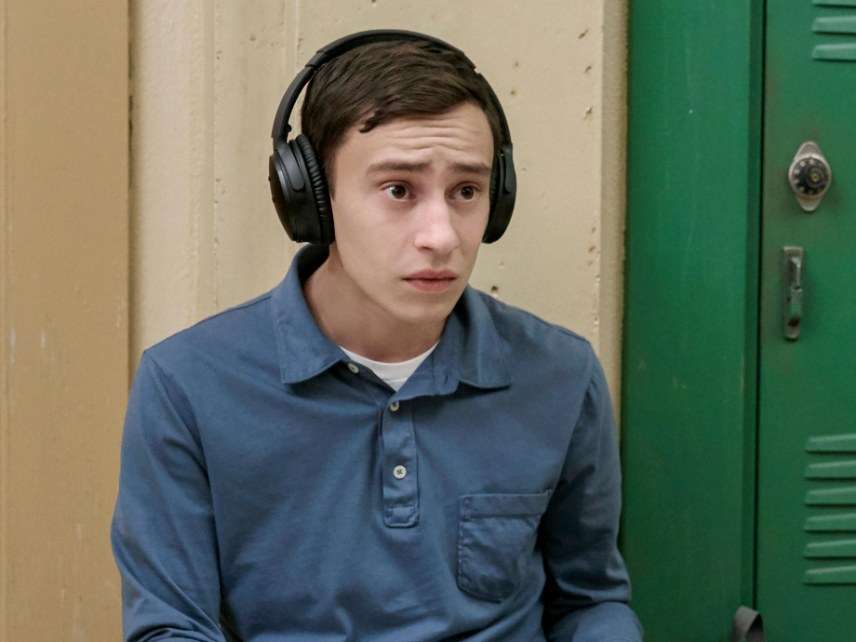Autistic Teen Takes Center Stage on Netflix's Atypical
Also: Another mediocre Wayans family show.

Atypical. Available now on Netflix.
Marlon. NBC. Wednesday, August 17, 9 p.m.
Great false myths about television, No. 12,092: that for decades, The Adventures of Ozzie & Harriet and Leave it to Beaver and their two-WASP-kids-and-a-picket fence suburban utopia were the only templates for portrayal of the American family. Actually, one of television's first sitcoms, The Goldbergs, which debuted in 1949, was set in a Jewish tenement in the Bronx. And in 1957, a quarter-century before his freakout over TV drama's first gay son in Dynasty, John Forsythe was already learning the challenges of single parenting in Bachelor Father, raising an orphaned niece.
That said, in the past few years, sitcoms have been aggressively expanding their range in the past few years with shows like Blackish (in which an affluent black family simultaneously embraces and struggles against the bougie temptation) and Speechless (in which a non-speaking kid with muscular dystrophy is not merely present—which itself would be a first—but the star).
The trend continues, not altogether successfully, this week, with Netflix's Atypical, which chronicles the coming-of-age of an autistic teenager, and Marlon, a raucous account of a divorced couple trying to keep their family together.
Autistic characters are nothing new on TV. There was young Max Braverman on NBC's Parenthood, who once asked his parents with genuine curiosity, "Why do all the other kids hate me? Is it because I'm weird?" Or homicide detective Sonya Cross of FX's The Bridge, who apologized when her questioning brought a murder victim's wife to tears: "Am I not showing empathy?"
But Atypical is the first time in which autism and its effects have been at a show's center instead of its periphery. Keir Gilchrist (so good as the emotionally whipsawed gay son on United States of Tara, and even better here) as the autistic Sam, trying to negotiate the emotional shoals of adolescence without a chart or even a clue.
Unable to spot social cues, Sam needs advice; unable to comprehend sarcasm or irony, he turns to a website called HowToTalkToHos.com for advice. Aurally striking words like "twat" trigger his tendency to get caught in an endless loop of repetition. Each new disaster triggers a new round of mindlessly brutal cruelty from his schoolmates. After watching a bit of this, you'll stop wondering at Sam's odd obsession with Antarctica, a place that, he notes, gets less than four inches of rain a year and is technically a desert. "That's why I like it," he explains in his low-key narration. "It's not what it looks like."
Sam's social malfunctions fly through his family like psychological shrapnel, leaving collateral casualties everywhere. His mother (Jennifer Jason Leigh, Revenge), her own emotional flesh flayed away after years of nursing his wounds ("Every time the phone rings, I jump; every time") cannot even begin to calculate the potential damage to her son of a romance gone wrong. His father (Michael Rapaport, Prison Break) broods that his incomprehension of Sam's problems is regarded by the rest of the family as indifference. And the hip cynicism of his younger sister (the extremely talented newcomer Brigette Lundy-Paine) masks a growing rage that literally makes her want to scream.
Created and written by Robia Rashid, known mostly for her popular but lightweight sitcom How I Met Your Mother, Atypical in some ways has the heart of an after-school special, with lots of earnest explanatory dialogue tossed around Sam's therapist, parents, and their friends. But her wise choice to expend as much effort on the characterizations of family members as on Sam himself has expanded the show from a fundraising infomercial to something much more wrenching and complex, a reflection on the high cost of defending the defenseless in a cold world.
If Atypical is extraordinary, Marlon is—well, ordinary. Supposedly a loosely fictionalized version of his own domestic life, it stars Marlon Wayans as a divorced dad who spends most of his time in a pillow-and-tent play fort in his wife's living room, where he can counsel his two kids on how to use gangsta talk to terrify their white classmates for fun and profit.
This is not without its moments; the Wayans has not yet been born who can't draw some laughs just by raising an eyebrow. (Though not by endless repetition of the phrase "Oh, hell no!" something that his producers really ought to tell him.) But mostly Marlon is a lot of mugging and shouting by the star, with the rest of the cast reduced to a collective straight man. As somebody once said, a hundred times in half an hour, oh, hell no.


Show Comments (8)